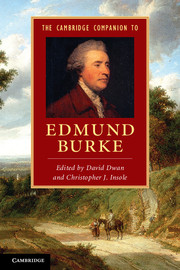Cambridge University Press has recently published D Dwan and
C Insole (eds), The Cambridge Companion to Edmund Burke:
 Edmund
Burke prided himself on being a practical statesman, not an armchair
philosopher. Yet his responses to specific problems – rebellion in America, the abuse of power in India and Ireland,
or revolution in France
– incorporated theoretical debates within jurisprudence, economics, religion,
moral philosophy and political science. Moreover, the extraordinary rhetorical
force of Burke's speeches and writings quickly secured his reputation as a
gifted orator and literary stylist. This Companion provides a comprehensive
assessment of Burke's thought, exploring all his major writings from his early
treatise on aesthetics to his famous polemic, Reflections on the Revolution
in France. It also examines the vexed question of Burke's Irishness and
seeks to determine how his cultural origins may have influenced his political
views. Finally, it aims both to explain and to challenge interpretations of
Burke as a romantic, a utilitarian, a natural law thinker and founding father
of modern conservatism.
Edmund
Burke prided himself on being a practical statesman, not an armchair
philosopher. Yet his responses to specific problems – rebellion in America, the abuse of power in India and Ireland,
or revolution in France
– incorporated theoretical debates within jurisprudence, economics, religion,
moral philosophy and political science. Moreover, the extraordinary rhetorical
force of Burke's speeches and writings quickly secured his reputation as a
gifted orator and literary stylist. This Companion provides a comprehensive
assessment of Burke's thought, exploring all his major writings from his early
treatise on aesthetics to his famous polemic, Reflections on the Revolution
in France. It also examines the vexed question of Burke's Irishness and
seeks to determine how his cultural origins may have influenced his political
views. Finally, it aims both to explain and to challenge interpretations of
Burke as a romantic, a utilitarian, a natural law thinker and founding father
of modern conservatism.
The Companion includes
my ‘Burke on law and legal theory’. The introduction
notes that:
Burke’s frequent recourse to
legal arguments and principles gleaned from traditions of common law and
natural law jurisprudence also need to be interpreted within a broader
historical and intellectual context. As Seán Donlan argues, Burke could sing
the praises of England’s ‘ancient constitution’ as well as any other Whig, but he
could also challenge parochial views of English legal history and was
especially critical of the insularity of popular common law histories
associated with William Blackstone. Instead, he chose to emphasise the degree
to which English law was the result of frequent and constructive communication
with the continent. Throughout his life he expressed impatience at narrow or
excessively positivist constructions of law and insisted that all legal schemes
must accommodate the particular manners and morals of nations as well as
ethical constraints imposed by human nature. Of course, critics have disputed
the meaning and importance of these ethical constraints, and it is an issue
that Christopher Insole addresses in his chapter on Burke’s use of natural law.

No comments:
Post a Comment
Note: Only a member of this blog may post a comment.